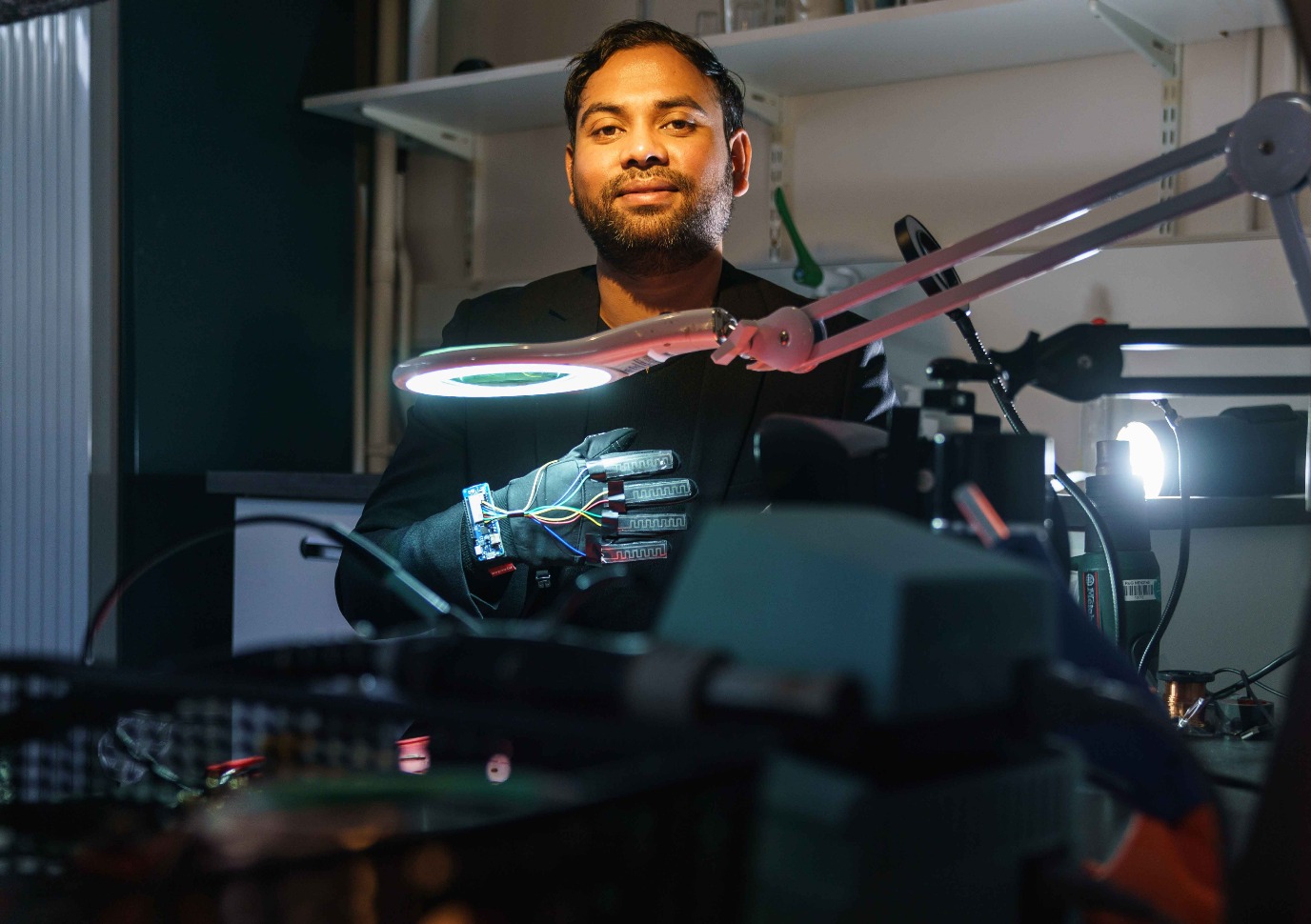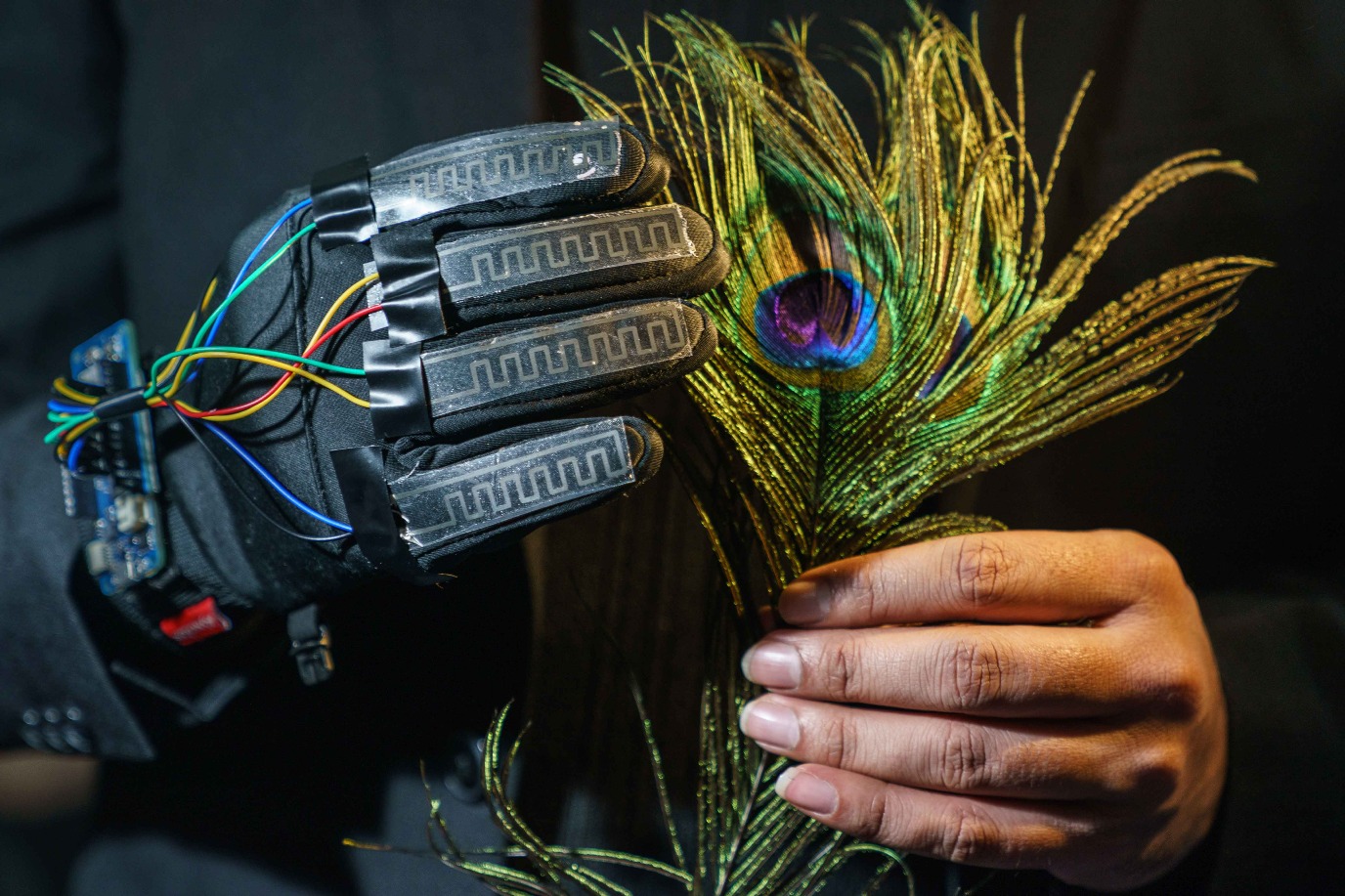Sensor met gevoel
Hoe zou het zijn wanneer de prothese van een hand of been echt kan voelen? Bij het Engineering and Technology Institute (ENTEG) van de RUG ontwikkelt Ajay Kottapalli op de biologie geïnspireerde sensoren die dit mogelijk moeten maken. ‘We maken ze in de vorm van draagbare elektronica.’ De belangrijkste toepassing waar hij nu aan werkt zijn inlegzooltjes voor patiënten met Parkinson, die gemakkelijk vallen tijdens het lopen. De zooltjes herkennen bewegingen met een hoog risico, en waarschuwen de drager dan direct.


Alle sensoren die Kottapalli ontwikkelt zijn gebaseerd op piëzo nanomaterialen. In reactie op druk produceren die een klein stroompje, of hun elektrische weerstand verandert. Deze materialen zijn te verwerken in textiel, maar ook te printen in 2D of 3D. Het is zelfs mogelijk zo’n sensor te printen op papier van zetmeel dat dan op de huid wordt geplakt als een tijdelijke tatoeage. Al deze draagbare sensoren zijn volledige biologisch afbreekbaar. ‘We willen niet nog meer elektronisch afval produceren.’
Kottapalli en zijn team ontwikkelden al ‘voelende sensoren’ die een op vingerafdrukken lijkende 3D-structuur hebben. Daarmee zouden mensen met een amputatie weer kunnen voelen. Voor het maken van zo’n sensor is een combinatie van natuurkunde en materiaalwetenschap nodig, en het doorsturen en analyseren van de signalen vraagt om elektrotechniek. Het is nu nog niet mogelijk om het ‘gevoel’ door te sturen naar een menselijk brein. ‘Daarvoor heb je slimme implantaten nodig, maar we kunnen al wel feedback sturen naar spieren. We werken hieraan met collega’s van het UMCG.’ Het is eenvoudiger de sensoren te koppelen aan een robot. De gevoels-sensoren zijn bijvoorbeeld nuttig voor robots die vruchten plukken, die daarmee kunnen bepalen hoe rijp tomaten of frambozen zijn.
Inmiddels zijn een aantal van de medische sensoren van Kottapalli klaar om te testen bij mensen, zoals de slimme inlegzooltjes die de loopbeweging van patiënten met Parkinson meten. Maar dergelijke zooltjes zijn ook nuttig voor patiënten die een nieuwe heup hebben gekregen. Tijdens de revalidatie moeten ze namelijk actief zijn om herstel te bevorderen, maar niet té actief. De sensoren helpen hen om precies genoeg te doen voor een optimaal herstel.
Tekst: FSE Science Newsroom | René Fransen
Foto’s: Reyer Boxem
In Makers van de RUG belichten we elke twee weken een onderzoeker die iets concreets heeft ontwikkeld: van zelfgemaakte meetapparatuur voor wetenschappelijk onderzoek tot kleine of grote producten die ons dagelijks leven kunnen veranderen. Zo dragen RUG-onderzoekers bij aan oplossingen voor grote wetenschappelijke en maatschappelijke uitdagingen.
Techniekonderwijs en -onderzoek maken bij de RUG al decennia deel uit van een breed palet aan sterke disciplines en landelijk werken we steeds intensiever samen met de vier technische universiteiten.
Eerdere portretten van 'Makers' vind je op de overzichtspagina .
Meer informatie
Ajay Kottapalli
Meer nieuws
-
17 februari 2026
De lange zoektocht naar nieuwe fysica
-
10 februari 2026
Waarom slechts een klein aantal planeten geschikt is voor leven
